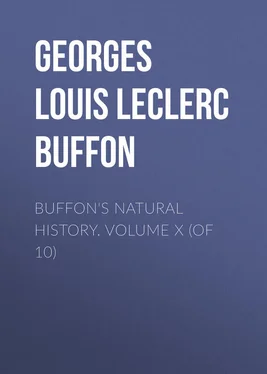Georges Buffon - Buffon's Natural History. Volume X (of 10)
Здесь есть возможность читать онлайн «Georges Buffon - Buffon's Natural History. Volume X (of 10)» — ознакомительный отрывок электронной книги совершенно бесплатно, а после прочтения отрывка купить полную версию. В некоторых случаях можно слушать аудио, скачать через торрент в формате fb2 и присутствует краткое содержание. Издательство: Иностранный паблик, Жанр: foreign_antique, foreign_prose, на английском языке. Описание произведения, (предисловие) а так же отзывы посетителей доступны на портале библиотеки ЛибКат.
- Название:Buffon's Natural History. Volume X (of 10)
- Автор:
- Издательство:Иностранный паблик
- Жанр:
- Год:неизвестен
- ISBN:нет данных
- Рейтинг книги:5 / 5. Голосов: 1
-
Избранное:Добавить в избранное
- Отзывы:
-
Ваша оценка:
- 100
- 1
- 2
- 3
- 4
- 5
Buffon's Natural History. Volume X (of 10): краткое содержание, описание и аннотация
Предлагаем к чтению аннотацию, описание, краткое содержание или предисловие (зависит от того, что написал сам автор книги «Buffon's Natural History. Volume X (of 10)»). Если вы не нашли необходимую информацию о книге — напишите в комментариях, мы постараемся отыскать её.
Buffon's Natural History. Volume X (of 10) — читать онлайн ознакомительный отрывок
Ниже представлен текст книги, разбитый по страницам. Система сохранения места последней прочитанной страницы, позволяет с удобством читать онлайн бесплатно книгу «Buffon's Natural History. Volume X (of 10)», без необходимости каждый раз заново искать на чём Вы остановились. Поставьте закладку, и сможете в любой момент перейти на страницу, на которой закончили чтение.
Интервал:
Закладка:
Calcination generally received, is, with respect to fixed and incombustible bodies, what combustion is to volatile and inflammable. Calcination, like combustion, needs the assistance of air; it operates so much the quicker, as it is furnished with a greater quantity of that element, without which the fiercest fire cannot calcine nor inflame any thing, except such matters as contain in themselves all the air necessary for those purposes. This necessity for the concurrence of air in calcination, as in combustion, indicates, that there are more things common between them than has been suspected. The application of fire is the principle of both; that of air is the second cause, and almost as necessary as the first; but these two causes are equally combined, according as they act in more or less time, and with more or less power on different substances.
Combustion operates almost instantaneously; calcination is sometimes so long, as to be thought impossible; for in proportion as matters are more incombustible, the calcination is there more slowly made; and when the constituent parts of a substance, such as gold, are not only incombustible, but appear so fixed as not to be volatilized, calcination produces no effect. They must both, therefore, be considered as effects of the same cause, whose two extremes are delineated to us by phosphorus, which is the most inflammable of all bodies, and by gold, which is the most fixed and least combustible. All substances comprized between these two extremes, will be more or less subjected to the effects of combustion and calcination, according as they approach either of them; insomuch, that in the middle points there will be found substances that endure an almost equal degree of both; from which we may conclude, that all calcination is always accopmanied with a little combustion, and all combustion with a little calcination. Cinders and other residue of the most combustible matters, demonstrate that fire has calcined all the parts it has not burned, and consequently, a little calcination is found here with combustion. The small flame which rises from most matters, that are calcined, demonstrates also that a slight combustion is made. Thus, we must not separate these two effects, if we would find out the results of the action of fire on the different substances to which it is applied.
But it may be said, that combustion always diminishes the volume or mass, on account of the quantity of matter it consumes; and that, on the contrary, calcination increases the weight of many substances. Ought we then to consider these two effects whose results are so contrary, as effects of the same nature? Such an objection appears well-founded, and deserves an answer, especially as this is the most difficult point of the question. For that purpose let us consider a matter in which we shall suppose one half to be fixed parts, and the other volatile or combustible. By the application of fire to this, all the volatile or combustible parts will be raised up or burnt, and consequently separated from the whole mass; from hence this mass or quantity of matter will be found diminished one half, as we see it in calcareous stones, which lose near half their weight in the fire. But if we continue to apply the fire for a very long time to the other half, composed of fixed parts, all combustion and volatilization being ceased, that matter, instead of continuing to lose its mass, must increase at the expense of the air and fire with which it is penetrated; and those are matters already calcined, and prepared by Nature to the degree where combustion ceases, and consequently susceptible of increasing the weight from the first moment of the application. We have seen, that light extinguishes on the surface of all bodies which do not reflect; and that heat, by long residence, fixes partly in the matters which it penetrates; we know also that air is necessary for calcination, or combustion, and the more so for calcination as having more fixity in the external parts of bodies, and becomes a constituent part: hence, it is natural to imagine, that this augmentation of weight proceeds only from the addition of the particles of light, heat, and air, which are at length fixed and united to one matter, against which they have made so many efforts, without being able either to raise or burn them. This appears clearly to be the fact, for if we afterwards present a combustible substance to them they will quit the fixed matter, to which they were only attached through force, retake their natural motion, elasticity, and volatility, and all depart with it; from hence, metal, or calcinized matter, to which these volatile parts has been rendered, retakes its pristine form, and its weight is found diminished by the whole quantity of fiery and airy particles which were fixed in it, and which had been just raised by this new combustion. All this is performed by the sole law of affinities; and there seems to be no more difficulty to conceive how the lime of a metal is reduced, than to understand how it is precipitated in dissolution; the cause is the same, and the effects are similar. A metal dissolved by an acid, will precipitate when to this acid another substance is offered with which it has more affinity than metal, the acid then quits it and falls to the bottom. So, likewise, this metal calcines, that is, loaded with parts of air, heat, and fire, which being fixed, keeps it under the form of a lime, and will precipitate, or be reduced, when presented to this fire and fixed air, from the combustible matters with which they have more affinity than with the metal; the latter will retake its first form as soon as it is disembarrassed from this superfluous air and fire, at the expence of the combustible matters offered to it, and the volatile parts it had lost.
I think I have now demonstrated, that all the little laws of chemical affinities, which appeared so variable and different, are no other than the general laws of attraction, common to all matter; that this great law, always constant and the same, appeared only to vary in its expression, which cannot be the same when the figure of bodies enters, like an element, into their distance. With this new key we can unlock the most profound secrets of Nature; we can attain the knowledge of the figure of the primitive parts of different substances; assign the laws and degrees of their affinities; determine the forms which they take by re-uniting, &c. I think also I have made it appear that impulsion depends on attraction; and that, although it may be considered as a different force, it is, notwithstanding, a particular effect of this sole and general one. I have shewn the communication of motion to be impossible without a spring, whence I have concluded, that all bodies in Nature are more or less elastic, and that there is not one perfectly hard; that is, entirely deprived of a spring, since all are susceptible of receiving motion. I have endeavoured to shew how this sole force may change direction, and attraction become repulsion; and from these grand principles, which are all founded on rational mechanics, I have sought to deduce the principal operations of Nature, such as the production of light, heat, and fire, and their action on different substances; this last object which interests us the most is a vast field, but of which I can only cultivate a little spot, yet I presume I may render some assistance, by putting into more capable and laborious hands the instruments I made use of. These instruments were the three modes of making use of fire, that is, by its velocity, volume, and mass; by applying it concurrently to the three classes of substances, which either lose, gain, or are not affected by the application of fire. The experiments which I had made on the refrigeration of bodies, on the real weight of fire, on the nature of flame, on the progress of heat, or its communication, its diperdition, its concentration, or its violent action without flame, &c. are also so many instruments which will spare much labour to those who choose to avail themselves of them, and will produce an ample harvest of knowledge.
Читать дальшеИнтервал:
Закладка:
Похожие книги на «Buffon's Natural History. Volume X (of 10)»
Представляем Вашему вниманию похожие книги на «Buffon's Natural History. Volume X (of 10)» списком для выбора. Мы отобрали схожую по названию и смыслу литературу в надежде предоставить читателям больше вариантов отыскать новые, интересные, ещё непрочитанные произведения.
Обсуждение, отзывы о книге «Buffon's Natural History. Volume X (of 10)» и просто собственные мнения читателей. Оставьте ваши комментарии, напишите, что Вы думаете о произведении, его смысле или главных героях. Укажите что конкретно понравилось, а что нет, и почему Вы так считаете.











